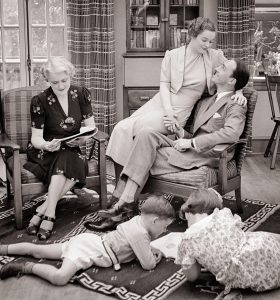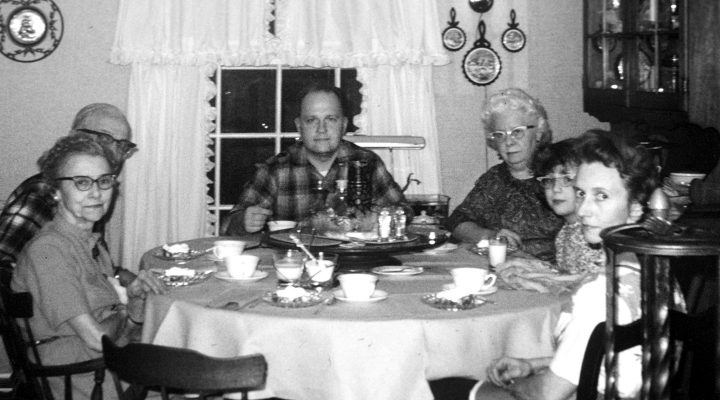“Lois! Get me my 10-cubed Pepsi!” my former Bible professor would yell across the house in their biblical home. His wife would immediately drop whatever she was doing, fill a glass with exactly 10 ice cubes, pour his Pepsi, and hand it to him as he sat in his chair.
Even though many of us didn’t grow up in such a blatantly misogynistic home, the power dynamics reveal a story many of us have watched all our lives. The women quietly clean the house in preparation for the family gathering, happily cook and serve the meal, and then enjoy their conversation cleaning up after the meal while the men of the family walk off with full bellies to watch football.
The biggest focus of evangelicalism and perhaps the greatest opportunity for connection with non-Christians today is the family. But evangelicalism’s obsession with “the created order” of biblical manhood and womanhood completely undermines its chances to connect on common ground.
The evolution of the family
The “biblical family” gets tossed around with its neatly packaged, static definitions and carefully segregated roles. But the reality is that healthy families today look nothing like families in the Bible.
On a macro level, families have evolved from patriarchal alliances of property ownership and wealth distribution for the purpose of providing heirs to the individual choices between consenting adults who desire to love each other and live together based on chemistry and compatibility.
On a micro level, evolution tends to happen slowly over time in unnoticeable ways. But in recent years, the evolution of the family has picked up considerably.
According to research by the Survey Center of American Life: “American family life has profoundly changed over the past half century. The marriage rate is falling, women are having fewer children, and many Americans, young adults in particular, are rethinking what it means to be a family.”
Ironically, even though the family is being reimagined, it’s the one institution in American society that is held with a positive, hopeful optimism. Just 26% of Americans consider marriage to be “old-fashioned and out-of-date,” compared to 74% who disagree. The numbers are consistent between young adults (71%) and seniors (77%) and between men (73%) and women (74%). And while young people are often criticized by evangelicals for having sex outside of marriage, 76% of singles between 18 and 29 years of age maintain they are interested in getting married someday.

(Photo by H. Armstrong Roberts/ClassicStock/Getty Images)
Domestic duties for married mothers
In the face of such common interest, the disconnect happens due to the disparity and dissatisfaction that come from gendered roles and responsibilities in the home.
According to the Survey Center of American Life: “Women appear to take on a far greater burden, particularly with decisions regarding children.”
When asked who is responsible for the following duties in the home more often than their partner, respondents said:
- Scheduling children’s playdates — men 11%, women 69%
- Making doctor’s appointments and health decisions — men 17%, women 79%
- Planning social activities and outings — men 18%, women 51%
- Cleaning the house — men 19%, women 65%
- Doing laundry — men 21%, women 67%
- Cooking meals — men 27%, women 63%
- Paying bills and tracking spending — men 52%, women 54%
- Doing yard work or home repairs — men 70%, women 14%
With the exceptions of finances, yard work and repairs, the overwhelming responsibility for domestic duties falls on women, regardless of their employment status. The study also shows the numbers are more extreme for families with children.
So imagine what these numbers would be for Christian women who live in families that believe women are designed by God to fulfill what Desiring God calls “domestic proclivities and graces.”
Domestic duties and relationship satisfaction
One might assume these inequalities are leading women to feel oppressed in their relationships by having to shoulder so much of the burden. But in reality, women who do more of the work report the same relationship satisfaction as those who have a more equal share in the responsibilities.
However, there is one exception — cooking. Women who say they cook more than their spouse or partner report a lower level of relationship satisfaction than women who share the cooking or do less of the cooking.
Also, while the only areas men reported doing more of were yard work and house repairs, women reported significantly lower relationship satisfaction when they had to do those duties.
“Is it more likely that women have been conditioned by patriarchy so that handling the vast majority of household duties has become simply the water they swim in?”
It’s worth wondering at this point how much social conditioning affects these numbers. Is it likely that women have been designed by God to be OK with bearing the majority of the burden at home, even if they’re employed as well? Or is it more likely that women have been conditioned by patriarchy so that handling the vast majority of household duties has become simply the water they swim in?
Men, who are typically the beneficiaries of women doing most of the work, are a different story. According to SCAL: “Men who report doing much more of the house cleaning are significantly less satisfied in their relationships than men who say their spouse does this type of work more often or they do it roughly equally.”
In other words, women tend to do what is necessary to keep up with the house without it affecting their relationship, while men get really bothered if they suddenly are expected to clean the bathroom.
Counting the cost of having kids
Even though the vast majority of Americans value marriage, there is a significant difference in how much they value having children. According to SCAL, “Forty-four percent of seniors (age 65 or older) say a society that prioritizes marriage and child-rearing is better off, while only one-quarter (25%) of young adults (ages 18 to 29) say the same.”

(Photo by H. Armstrong Roberts/ClassicStock/Getty Images)
The largest difference between older and younger generations depends on how conservative they are. SCAL discovered: “Older liberals are somewhat more likely than young liberals to embrace the notion that society benefits when getting married and having children are priorities (23% vs. 15%).” However, they also found that “older conservatives are far more likely than young conservatives to believe in the societal benefit of people prioritizing marriage and children (64% vs. 37%).”
The hesitancy among young people regarding having children is due to how much it would cost and how much work it would be. Almost three-quarters (73%) said major personal sacrifices would be necessary to have children. And the overwhelming majority of the duties would fall on women.
It doesn’t take an economist or a therapist to recognize what’s going on here. Conservative complementarian men like Kevin DeYoung talk a big game about “(toting) your brood of children through Target.” But they warn against the “Social Gospel” of the government supporting financially vulnerable families and then create gender roles that excuse men from performing “domestic proclivities and graces.”
Thus, their politics and gender roles completely undermine their culture war strategy of having large families because they create the top reasons people give against having children.
Divorce, remarriage and who benefits
As our society has evolved to become more egalitarian, divorce rates have gradually declined. Equally unsurprising is the fact that “women continue to initiate divorces at far higher rates than men do.”
SCAL found that 66% of women said they initiated the divorce, while 21% said it was mutual, and just 12% said the men initiated the divorce.
“As women become more independently wealthy, their divorce rates go up.”
As women become more independently wealthy, their divorce rates go up. However, as men become more independently wealthy, their divorce rates go down.
Why? Could it be that women who are flourishing in the workplace simply cannot continue doing most of the work at home by themselves as well, while men who are flourishing in the workplace don’t even notice the work they’ve never done at home?
After the divorce is finalized, 73% of women “express no interest in marrying again,” while the majority of men would love to find another marital arrangement.
It’s no wonder why SCAL concluded that men “seem to benefit more from the arrangement than women do” and that “the ongoing tension” of women bearing most of the burden “may be one reason women are much more likely than men to leave their marriage and, after doing so, less likely to get married again.”
Who do you go to for advice — mom or dad?
The biggest fantasy of complementarian men is being the spiritual leader of their home by washing their wives in the water of the word and bringing up their children in the nurture and admonition of the Lord. Their theologies of the inerrancy, perspicuity (ironically meaning clarity), and sufficiency of the Bible for everything paired with their hierarchy of male headship means they have all the answers to all of life’s problems.
With that level of insight, you’d think when children face the hardships of life, they’d seek out the advice of their dads.
But according to SCAL, “Americans report that growing up the person they would turn to first when they had a problem was:”
- Mom 41%
- Friend 22%
- Sibling 11%
- Nobody 10%
- Dad 8%
Dads have a lower percentage than “nobody”!
Some advice from a common-sense, self-aware stay-at-home dad
At some point we need to stop kidding ourselves and admit that a complementarian vision of the family is destroying the family. It’s foolishness to continue doubling down on men being in charge and getting their wives pregnant with a bunch of kids in a home for them to take care of mostly by themselves.
“At some point we need to stop kidding ourselves and admit that complementarian vision of the family is destroying the family.”
In December 2019, I stepped aside from my cleaning business of nearly 20 years so my wife could pursue her career in interior design and I could work on writing while I stayed home with the kids.
In our case, the domestic duties are a bit more mixed. I tend to schedule the children’s playdates, take them to their doctor’s appointments, plan outings and cook meals. It makes sense since I’m the one who is home with them all day that I’d be the one handling those duties.
Of course, laundry for a family of seven is a bit of a beast. So we attempt to carry that load together. I clean the house during the day, while we work together in the evenings or on her days off. We change up who cleans and who puts the kids down based on who needs a break or has work projects to finish. Although I tend to be the one who pays the bills, we both keep track of household spending. And while I do more of the yard work, she handles more of the home repairs.
But none of these responsibilities in our home have anything to do with gender. They’re determined by our schedule, availability, personal interest, work responsibilities or energy. So there’s no relational strain or gender entitlement in any of it.
Whatever differences Americans may have on our views of what marriage means and who can get married, the vast majority of our culture values marriage. You would think that would be a common ground evangelicals would attempt to connect on. But unlike conservative evangelicals, our culture values marriage as an opportunity for consent-based, mutual care where everyone is known, valued and loved.
If complementarian men continue to insist that gender exists on a hierarchy where men get to go out and pursue their dreams and come home to a fully cooked meal from a smoking hot wife, then they’re eventually going to climb their ladder of influence to a lower percentage chance of mentoring their kids than nobody.
So let’s have the self-awareness to be honest about the self-destructive nature of patriarchy. And then let’s be adults who work together with our partners to figure out how we can mutually care for one another and our families.

Rick Pidcock
Rick Pidcock is a 2004 graduate of Bob Jones University, with a Bachelor of Arts degree in Bible. He’s a freelance writer based in South Carolina and a former Clemons Fellow with BNG. He recently completed a Master of Arts degree in worship from Northern Seminary. He is a stay-at-home father of five children and produces music under the artist name Provoke Wonder. Follow his blog at www.rickpidcock.com.
Related articles:
Has God really ‘staked everything on men’? | Analysis by Mark Wingfield
What does complementarianism have to do with Domestic Violence Awareness Month? | Analysis by Rick Pidcock
Complementarianism harms men and women both | Opinion by Lindsay Bruehl


